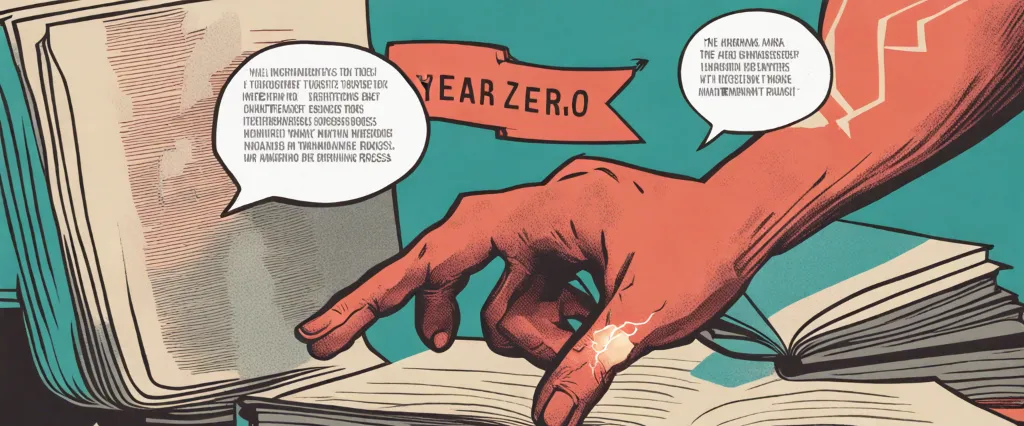
In the realm of historical narratives, Year Zero by Ian Buruma and 1453 by Roger Crowley stand out as captivating accounts of crucial moments in global history. Although these two books revolve around different time periods and regions, they share a common purpose of exploring pivotal events and their far-reaching consequences. Buruma’s Year Zero delves into Asia’s tumultuous journey towards modernity during the late 1940s, while Crowley’s 1453 meticulously examines the dramatic siege of Constantinople, marking the end of the Byzantine Empire and the rise of the Ottoman Empire. In this comparative study, we will explore the distinctive stylistic choices, the thematic orientations, and the narrative approaches employed by Buruma and Crowley. Through a critical lens, we will uncover the strength of each author’s work, the unique insights they offer regarding historical interpretations, and the manner in which they provide deeper understanding of these defining moments that shaped the course of our world.
Brief Summary of Two Books
Year Zero by Ian Buruma
“Year Zero” by Ian Buruma is a thought-provoking non-fiction book that explores the aftermath of World War II in Asia. Buruma, a Dutch historian and journalist, focuses on the years following Japan’s surrender and delves into the complexities of the Japanese experience during this period.
The book delves into the idea of collective guilt and how it was imposed upon the Japanese people by the victorious Allied powers. Buruma explores the war crimes committed by the Japanese military and the subsequent efforts by the Japanese government and society to come to terms with their wartime past.
Through personal stories and interviews with Japanese individuals, Buruma examines the moral and psychological dilemmas faced by those who were complicit in the war, as well as those who suffered under Japanese occupation. He also reflects on the challenges the country faced in rebuilding and establishing a democratic society.
Buruma highlights the complex balance between acknowledging the past, seeking justice, and moving forward as a nation. He explores the tensions between the need to confront the past and the desire to preserve national dignity and pride. Furthermore, he raises questions about how individuals and societies can reckon with history and find a path to reconciliation.
Year Zero” goes beyond a simple historical account and delves into the broader themes of memory, responsibility, and the complexities of post-war societies. It offers a nuanced understanding of the Japanese experience during this period and provides valuable insights into the challenges faced by countries transitioning from war to peace.
1453 by Roger Crowley
“1453” by Roger Crowley is a historical non-fiction book that explores the fall of the Byzantine Empire and the conquest of Constantinople by the Ottoman Turks. The book provides a detailed account of the events leading up to the siege, the tactics used by both sides during the siege, and the ultimate capture of the city by Mehmet II, the Ottoman Sultan. Crowley analyses the political, religious, and socio-economic factors that played a role in the demise of the Byzantine Empire and highlights the significant impact this event had on world history. He also examines the key individuals involved, including the Byzantine Emperor Constantine XI and Mehmet II, shedding light on their strategies, motivations, and the consequences of their actions. Overall, “1453” offers a comprehensive and engaging narrative of a critical turning point in the medieval world, showcasing the clash of civilizations and the end of an era.
Comparison between Two Books

Similarities in History Of Wars
Both “Year Zero” by Ian Buruma and “1453” by Roger Crowley explore the history of wars in different time periods and regions. Here are some similarities between the two books:
1. Historical Context: Both books provide a historical context to the wars they discuss. Year Zero” focuses on the immediate aftermath of World War II and its impact on various countries in East Asia, while “1453” explores the conquest of Constantinople by the Ottoman Empire. Both books examine the consequences of these wars on the political, social, and cultural landscapes of the regions they cover.
2. Human Stories: Both authors incorporate personal stories and eyewitness accounts into their narratives, giving a human perspective to the wars. They highlight the experiences of individuals who were directly affected by the conflicts, shedding light on their struggles, resilience, and the consequences they faced.
3. Geopolitical Implications: Both books delve into the geopolitical implications of the wars they discuss. Year Zero” examines how World War II shaped the power dynamics in East Asia, particularly with the rise of communist movements and the influence of global superpowers. “1453” explores the far-reaching consequences of the fall of Constantinople, which marked a pivotal moment in the balance of power between the Christian world and the expanding Ottoman Empire.
4. Influence on Modern Times: Both books connect the historical wars to the present, illustrating how the events they cover continue to shape the world today. “Year Zero” examines how the legacy of World War II still influences relations between Japan, China, and Korea, while “1453” highlights the lasting impact of the Ottoman conquest on the Middle East and Europe.
5. Military Strategy and Tactics: Both books delve into the military strategies and tactics employed during the respective wars. They analyze the key battles, the strengths and weaknesses of the different armies involved, and the innovations or decisive factors that influenced the outcome of these conflicts.
By exploring these similarities, both “Year Zero” and “1453” offer readers a comprehensive understanding of the historical wars they portray, allowing us to draw connections and gain insights into broader themes in the history of warfare.
Divergences in History Of Wars
Year Zero by Ian Buruma and 1453 by Roger Crowley are two books that explore different historical wars and their impacts. While they differ in terms of the specific wars they cover and the periods of history they focus on, they share a similar objective of shedding light on the significance of these conflicts.
Year Zero, written by Ian Buruma, delves into the aftermath of World War II in Japan and attempts to unravel the complex implications of the war on both individuals and society as a whole. Buruma examines the social and cultural transformation that took place in Japan as it sought to rebuild itself after the devastation of the war. He highlights the impact on ordinary citizens’ lives, their struggles, and their efforts to come to terms with the loss and destruction caused by the conflict. Year Zero emphasizes the war’s long-lasting consequences, reflecting on how nations can reconcile with their past and move forward.
On the other hand, 1453 by Roger Crowley focuses specifically on the epic siege and conquest of Constantinople by the Ottoman Empire, which marked the end of the Byzantine Empire and the beginning of a new era. Crowley explores the factors that led to the fall of Constantinople, including the military tactics employed by the Ottoman forces and the weaknesses of the Byzantines. The book also highlights the cultural and religious clashes between the Christian world and the expanding Islamic empire, examining how this pivotal moment in history shaped the subsequent geopolitical landscape of Europe and the Middle East.
While both Year Zero and 1453 are historical accounts that explore significant wars, they differ in several aspects. Firstly, Year Zero focuses on a more recent conflict, World War II, and its impact on Japan specifically. In contrast, 1453 delves into an event that took place centuries earlier, examining the fall of Constantinople and the repercussions it had on the political and religious dynamics of the time.
Furthermore, Year Zero takes a broader approach, examining the post-war societal transformation in Japan as a result of World War II. Buruma focuses on the psychological and emotional aftermath, showing how individuals and communities coped with the destruction and tried to rebuild their lives. In contrast, 1453 is more narrowly focused on the specific military conflict between the Ottoman Empire and the Byzantine Empire.
In terms of their perspectives, Year Zero adopts a more introspective and personal approach, often expressing the author’s own observations and reflections. It combines historical analysis with personal anecdotes and interviews, offering a more nuanced understanding of the war’s effects. On the other hand, 1453 adopts a more traditional historical narrative, focussing on the broader context of the conflict and the geopolitical implications.
In conclusion, while both Year Zero by Ian Buruma and 1453 by Roger Crowley explore the history of wars, they do so from different angles. Year Zero examines the aftermath of World War II in Japan and the socio-cultural impact on its people, while 1453 focuses on the conquest of Constantinople and its broader consequences for Europe and the Middle East. Their divergences lie in the specific conflicts they cover, the periods they focus on, and their approach to narrating history.

Conclusion
Both Year Zero by Ian Buruma and 1453 by Roger Crowley are highly regarded books and have their own merits. It ultimately depends on the reader’s interests and preferences.
Year Zero by Ian Buruma is a non-fiction book that explores the history and aftermath of World War II in Asia. It delves into the complexities of the war’s impact on the region, including Japan, China, and Korea. Buruma provides insights into the political, social, and cultural ramifications of the war, making it a worthwhile read for those interested in understanding this period of history from an Asian perspective.
On the other hand, 1453 by Roger Crowley focuses on the fall of Constantinople to the Ottoman Empire. This historical event marked the end of the Byzantine Empire and had significant consequences for Europe and the Muslim world. Crowley presents a detailed and engaging account of the siege, highlighting the major players and the dramatic events that unfolded. For readers who enjoy narrative-driven history and are interested in medieval Europe and the Ottoman Empire, this book is an excellent choice.
In conclusion, both Year Zero and 1453 are valuable reads, but the decision of which one is more worthy ultimately depends on the reader’s interests in either Asian history in the aftermath of World War II (Year Zero) or the fall of Constantinople and its impact (1453).


